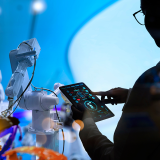
Att föregripa och hantera effekterna av förändring
Att föregripa och hantera effekterna av förändring är en av de sex främsta aktiviteterna i Eurofounds arbetsprogram för perioden 2021–2024. Eurofound kommer att lägga fram belägg för strukturella förändringar som påverkar EU:s ekonomi och arbetsmarknader och som främst drivs av digitalisering och övergången till en koldioxidneutral ekonomi , men också av covid-19 -krisen. Forskningen är avsedd att hjälpa beslutsfattarna att föregripa effekterna och förbereda de europeiska arbetsmarknaderna och arbetsplatserna för dessa förändringar.
Från och med 2021 kommer Eurofound att ge en inblick i de effekter som dessa megatrender har på levnads- och arbetsvillkoren i EU. På området digitalisering kommer forskningen att fokusera på effekten på sysselsättningen och arbetsvillkoren, liksom på arbetsmarknaden. Områden som ska tas upp är t.ex. dialogen mellan arbetsmarknadens parter (den sociala dialogen) och dess roll i utformningen av strukturella förändringar, regelverk, socialt skydd och artificiell intelligens (AI). Med utgångspunkt i tidigare forskning om plattformsarbete kommer perioden 2021–2024 att ge oss en möjlighet att fokusera på att kartlägga och lägga fram en bedömning av de politiska initiativens effektivitet vad gäller hanteringen av de identifierade utmaningarna vid plattformsarbete.
Eurofound kommer även att sikta på att stödja EU:s övergång till en koldioxidneutral ekonomi, däribland kretsloppsekonomin och genomförandet av EU:s återhämtningsinstrument NextGenerationEU, genom att undersöka de socioekonomiska effekterna. I detta ingår sysselsättningsövergångar och omvandling av arbetstillfällen och arbetsvillkor, liksom de fördelningseffekterna av politiska strategier mot klimatförändring. En del av detta arbete kommer att bygga på resultaten av ett pilotprojekt om framtiden för tillverkningsindustrin (FOME) som Eurofound genomför.
För att kunna fortsätta med detta arbete under 2021–2024 kommer Eurofound att samarbeta med olika internationella organisationer och EU-byråer, t.ex. med Europeiska miljöbyrån (EEA) på området för sociala följder av klimatpolitik. Vidare kommer det befintliga samarbetet med andra forskningsinstitut att konsolideras inom områdena digitalisering – det gemensamma forskningscentrumet (JRC), Byrån för grundläggande rättigheter (FRA) och Europeiska arbetsmiljöbyrån (EU-Osha). Ytterligare partnerskap med Internationella arbetsorganisationen (ILO) förutses även vad gäller området arbetsliv i förändring.
”EU:s ekonomi och arbetsmarknader kännetecknas av effekten av megatrender, särskilt digitaliseringen och övergången till en koldioxidneutral ekonomi. Det är viktigt att utforska exakt hur dessa övergångar fungerar, vad som förändras och hur detta kommer att påverka inte bara företagen, utan även arbetsstyrkan och samhället.”
Irene Mandl, chef för anställningsenheten



































